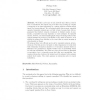127 search results - page 21 / 26 » Proving Properties of Security Protocols by Induction |
TCC
2009
Springer
16 years 5 days ago
2009
Springer
The concept of witness-hiding suggested by Feige and Shamir is a natural relaxation of zero-knowledge. In this paper we identify languages and distributions for which many known co...
101
click to vote
TIT
2008
14 years 11 months ago
2008
Error-correcting codes and matroids have been widely used in the study of ordinary secret sharing schemes. In this paper, the connections between codes, matroids, and a special cla...
PET
2004
Springer
15 years 5 months ago
2004
Springer
We define a new type of mix network that offers a reduced form of robustness: the mixnet can prove that every message it outputs corresponds to an input submitted by a player wit...
JCS
2010
14 years 10 months ago
2010
raction of cryptographic operations by term algebras, called Dolev-Yao models, is essential in almost all tool-supported methods for proving security protocols. Recently significa...
CTRSA
2008
Springer
15 years 1 months ago
2008
Springer
Public key based authentication and key exchange protocols are not usually designed with privacy in mind and thus involve cleartext exchanges of identities and certificates before ...

